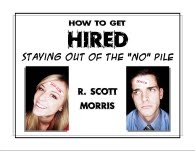Q: How should I answer the infamous "Why are you interested in this field?" question?
First off, the general reason for this question is that the interviewer wants to determine how serious you are about the particular field he or she is interviewing you for. You typically will get this question if you are new to the field (for example, a career-changer or recent graduate). This is the number one uncertainty that we recruiters face with first-time job seekers; are they really serious about a career in health care or consulting or zoology? You guys are a big risk because most of you lack a track record that we can point to for guidance.
We are looking for you to mitigate this risk with your answer.
You want to address this concern head-on with proof that you understand what it means to be “a health care professional” or “zoologist”. You can do this by reiterating past experiences--or even conversations--that you have had that show that you are aware of what it will take to be successful in this career path. If you can speak to your passions and how this particular field touches them, all the better.
Are you wondering How to Get Hired? Join the discussion on my Facebook Group Polished and ask me anything you have ever wondered about resumes, cover letters, interviews, and job hunting!
Q: Should we Google our interviewer before an interview? I want to make a connection, but recently my interviewer seemed creeped-out.
I think the problem stems from the impersonal nature of the interviewing process. What is the average success rate for interviews? Over my career, it has to be in the low single digits. Your interviewer knows this, too.
Aware that the odds are pretty high that she is going to say “no” to you, she rightly does not want to get too personal - saying “no” to people is more difficult if you have a personal bond with them. This is why she may have been “creeped out”. Other than the obvious concern that you may be a stalker.
Personally, I applaud taking the initiative and trying to find out information about your interviewer. This is a good trait of successful people. Keep it up, but in light of the “creeping out” factor, we have to explore a better way to use this information to help you land the job.
One way is to search for experiences or aptitudes that you have in common with your interviewer. Then, focus on less personal ways of bringing these out in the interview. If you find out that your interviewer was an accounting major, when she asks, “tell me about a project that you worked on that you really enjoyed”, give her an analytical one that she can relate to.
Or, if she is from your home state, find a way to weave this into your conversation. If you can do this without seeming like a brown-noser, you will help her get comfortable with including your name on the callback list.
Don’t shy away from doing these sorts of things. Much of the interviewing process is intuition and feel. It is not devious or dishonest to create positive rapport with your interviewer. It is good self-marketing.
Information is power. Don’t be afraid to use it to promote your own cause - just don’t get too personal!
Are you wondering How to Get Hired? Join the discussion on my Facebook Group Polished and ask me anything you have ever wondered about resumes, cover letters, interviews, and job hunting!
Topic: Excellent, Superior and other Superlatives
When describing their skill levels, I often warn job seekers to refrain from using words like “excellent” and “superior” for four reasons:
1. These words are their opinions not mine. I don’t want to hear opinions. I want to see facts and examples and formulate my own conclusion.
2. Chances are I have a different, and likely higher, expectation of what it means to have “excellent communication skills” or “superior understanding of business marketing”. If there is not corroborating evidence to support these statements, they are likely to go in the “no” pile.
3. These statements of opinion are extra words that make it harder for me to find their relevant skills.
4. If they do make it to an interview, you can be assured that I am going to drill down very hard on this area and see if they meet my interpretation of these words.
Of course if you meet my definition of what an expert is, I want you on my team, but trust me, unless you have at least 5 years of work experience under your belt, you won’t . Best not to go there.
Btw, here is an easy fix. Change “excellent” or “superior” to something like “honed my”. This simple change makes the statements actions not opinions.
Are you wondering How to Get Hired? Join the discussion on my Facebook Group Polished and ask me anything you have ever wondered about resumes, cover letters, interviews, and job hunting!
David: While you were recruiting, how did you feel about candidates asking you for feedback on their performance?
I do not mind if candidates ask me for feedback. However, many recruiters are instructed by their legal departments not to give specific feedback to candidates, so do not be surprised if your yield from such inquires is not very high.
Try focusing your requests to address additional skills or experiences which would make you more attractive, as opposed to soliciting direct feedback of why you did not make the cut. You may get a better response.
Are you wondering How to Get Hired? Join the discussion on my Facebook Group Polished and ask me anything you have ever wondered about resumes, cover letters, interviews, and job hunting!
Topic: Cover Letter Body Paragraph(s)
For those of you struggling to formulate a cohesive message in your cover letter, try answering the following question. Generally, this is what recruiters are really asking you to tell them in the letter:
"Please describe for me in one or two paragraphs why you think you will add value to my team. Please give clear examples, not opinions, as to how:
1. Your skills will lead to success in the position we are offering.
2. Your strong character and intellectual capacity will propel you to future advancement."
Are you wondering How to Get Hired? Join the discussion on my Facebook Group Polished and ask me anything you have ever wondered about resumes, cover letters, interviews, and job hunting!
David: I'm in a fraternity, and I was wondering what your thoughts are on whether fraternity membership should be on a resume. Does including it help or hurt?
It is OK to mention fraternity membership, but only at the bottom of your resume. Perhaps, you will get lucky and make a connection with an alumnus.
In general, fraternities are good for building leadership and communication skills and suggest a well-rounded, social person. If you stay away from the rah, rah brotherhood stuff, mentioning it should be a net positive.
Are you wondering How to Get Hired? Join the discussion on my Facebook Group Polished and ask me anything you have ever wondered about resumes, cover letters, interviews, and job hunting!
Topic: Cover Letter Focus
The purpose of your cover letter is to introduce yourself to a prospective employer and articulate how you will add value to her firm. Many job seekers feel compelled to focus a meaningful part of their letters on what they hope to gain from the experience of working at a particular firm or in a particular role.
This is at best irrelevant information and should not be included unless it is explicitly asked for (e.g. some educational internships or non-profit opportunities, offering “an experience”, may actually encourage this).
It is not that employers do not care about this information, but it is not relevant to the process of deciding whether you should be called in for an interview. It only dilutes your message and may introduce risk, i.e. “I hope to gain intimate industry knowledge so that I can start my own firm”. Yikes!
Are you wondering How to Get Hired? Join the discussion on my Facebook Group Polished and ask me anything you have ever wondered about resumes, cover letters, interviews, and job hunting!
Justin: With less experience, what magic can I do to impress employers?
It's not about magic; it's about understanding what you are good at and crafting a message that accentuates these skills. Start by asking yourself what you like to do and what you are passionate about. Populate your resume and cover letters with examples that illustrate these things.
The true you will come out and someone is bound to recognize your talent. It is a tough market out there. You cannot be passive. You must work hard at it and make it happen yourself.
Are you wondering How to Get Hired? Join the discussion on my Facebook Group Polished and ask me anything you have ever wondered about resumes, cover letters, interviews, and job hunting!












